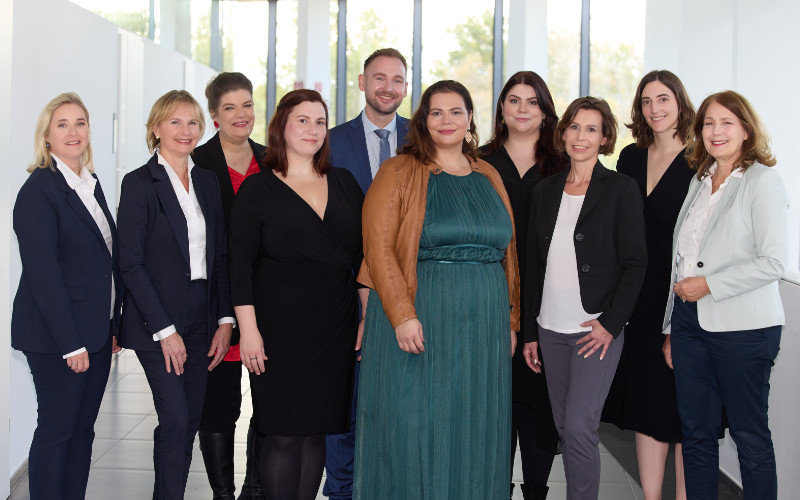Bachelor
Health Care and Nursing
full-time
The Bachelor's degree programme is a generalist training programme, i.e. students acquire nursing expertise and competence for all tasks of professional Health Care and Nursing, which are also regulated by law. The core competences include assuming overall responsibility for the nursing process. This includes activities such as identifying correlations and drawing conclusions from nursing diagnoses and interventions such as personal hygiene and mobilisation.
Another area of responsibility is collaboration in therapy and diagnostics, including infusions, injections, medication administration, dressing changes and pain management. Other major modules of the degree programme deal with nursing science, evidence-based nursing and scientific work. In all of these topics, the related sciences are essential building blocks, such as medicine and human science disciplines like sociology, psychology and education, in order to accompany an illness and to be able to derive actions and needs.
I can't subscribe to that. On the one hand, the carer has to get involved and tune in to the care situation and to the patients, clients, residents and their families and relatives, who are in an exceptional situation. Or it also requires the will to live the counselling skills. In the event of illness and in health promotion, communication skills are needed to convey information that may not be pleasant and requires (lifestyle) change in such a way that it is understandable and can be accepted and well integrated into life.
The basis for decisions is a holistic view. This is made up of nursing expertise, scientific findings, the viewpoint of those affected and environmental factors, e.g. the resources available. Reliable scientific nursing data and situational information are required, which are then applied correctly. This overall view encompasses the term Evidence Based Nursing - data from the research literature is only one part of it.
As generalists, our graduates can work in intramural, extramural and family-centred Health Care and Nursing. Specifically, this includes the geriatric field, family and/or community-centred care as well as the clinical field, which is again divided into surgical and conservative areas, for example. It is also possible to work in public health and rehabilitation facilities. Specialisations and further training also offer many opportunities, such as child and adolescent care, cancer care or discharge management.
Around 90% of students already know where they want to go at the time of their bachelor's exams and most of them have already applied for a job. We hear from graduates that around 90% actually have one, often several, job offers in the same year and then start work.
If you have the motivation to engage with people, to meet and accompany them in a holistic and respectful way and to work on complex issues, then you have a good basis for this. The profession offers so many opportunities to work and for career paths, it is meaningful - applicants should appreciate these advantages.
With the Bachelor's degree, graduates also obtain professional authorisation for the higher service for health care and nursing. It goes without saying that the programme covers the content required by law, as well as the nursing science requirements for the Bachelor's degree. The full-time degree programme offers space for theoretical teaching, learning and practising practical skills, as well as practical experience in the professional field, so that students gain confidence in their nursing work.
We have well-equipped, evaluated training facilities and long-standing cooperation partners, including the largest operators of healthcare facilities, a broad network with strong stakeholders - and of course our students benefit from this. The Bachelor's degree programme in Health Care and Nursing is divided into seven program divisions and two external locations.
The program divisions 1-4 and the three program divisions 5-7 of the Vienna Healthcare Network are located directly in the university city. We also co-operate with the external location of the Barmherzige Brüder Nursing Academy and the external location of the Vinzentinum Vienna. All programme divisions are led by their own heads of programme with the same curriculum (see photo). Nine programme divisions and one common goal.
Difficult, because I love being a carer so much, it's not easy to narrow it down. When I think about the patients and working in an interprofessional team, one of the best experiences is probably the feeling of providing safety. Working together with other professions and those affected to find the best possible way for patients to experience a cure, a recovery or an improvement in their situation - and sometimes just the empowerment and realisation that they are not alone.
Bachelor
full-time
Academic Expert Program
part-time
Academic Expert Program
part-time
Master
part-time
Master’s Program (CE)
part-time³
Master’s Program (CE)
part-time³
Master’s Program (CE)
part-time³
Academic Expert Program
part-time
Academic Expert Program
part-time
Academic Expert Program
part-time
